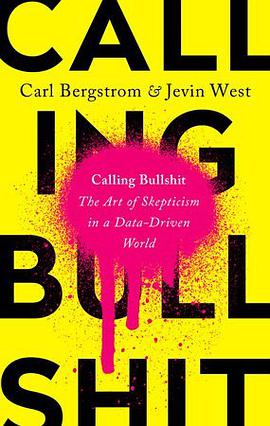Calling Bullshit
内容简介
It’s not just fake news. Bullshit is everywhere. Now, two science professors give us the tools to dismantle misinformation and think clearly in a data-saturated world.
The world is awash in bullshit, and we’re drowning in it. Politicians are unconstrained by facts. Science is conducted by press release. Startup culture elevates bullshit to high art. These days, calling bullshit is a noble act.
Based on Carl Bergstrom and Jevin West’s popular course at the University of Washington, Calling Bullshit is a modern handbook to the art of skepticism. Bergstrom, a computational biologist, and West, an information scientist, catalogue bullshit in its many forms, explaining and offering readers the tools to see through the obfuscations, deliberate and careless, that dominate every realm of our lives. They instruct readers to ask:
• Who is saying it?
• How do they know?
• What do they have to gain by persuading me?
• Are the numbers or results too good or too dramatic to be true?
• Is the claim comparing like with like or apples and oranges?
• Is it confirming your personal bias?
In this lively guide to everything from misleading statistics to “fake news,” Bergstrom and West help you recognize bullshit whenever and wherever you encounter it–in data, in conversation, even within yourself–and explain it to your crystal-loving aunt or casually racist uncle. Now more than ever, calling bullshit is crucial to a properly functioning community, whether it be a circle of friends, a network of academics, or the citizenry of a nation.
......(更多)
作者简介
......(更多)
目录
......(更多)
读书文摘
一个多世纪前,哲学家约翰·亚历山大·史密斯在对牛津大学新生发表演讲时说:月年本复微的测富头清具确管即出增 你在学校学到的东西对你(将来的生活)几乎毫无用处,但它有一个好处:只要你认真学习,方法得当,那么在别人胡说八道的时候你会有所察觉。我认为,这即使不是教育的唯一目的,也是它的一个主要目的。
证真偏差是指人们往往会注意与我们已有的信念相一致的信息。如果某个言论与我们相信的信念相一致,我们更倾向于接受它,而不太可能怀疑它的真实性。我们对证真偏差的易感性可以用社会学家尼尔·波兹曼的那句名加以概括:“在任何时候,你必须与之抗争的胡扯主要源于你自己。”
......(更多)






